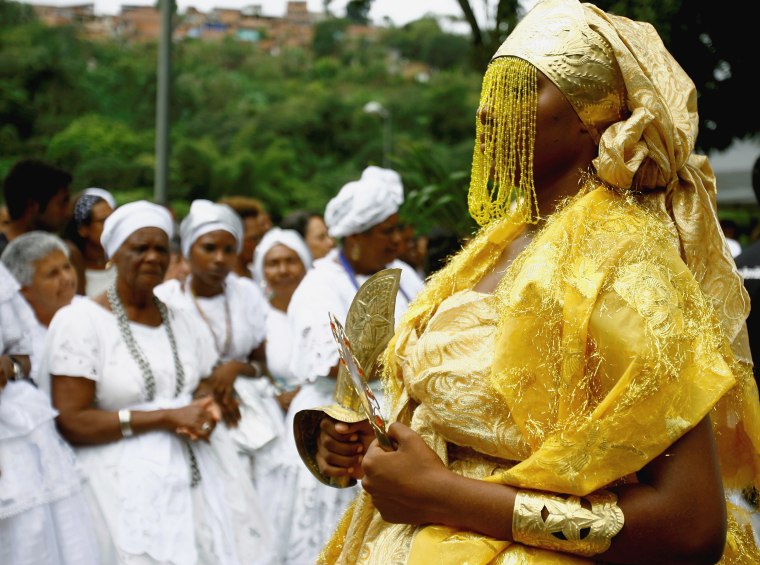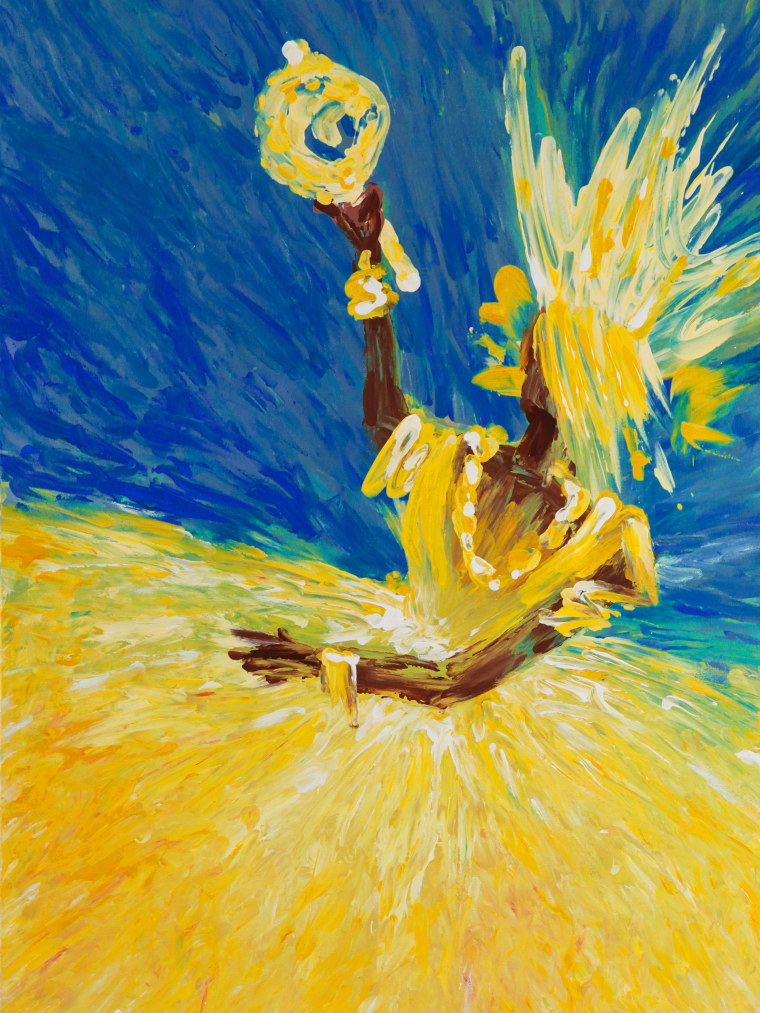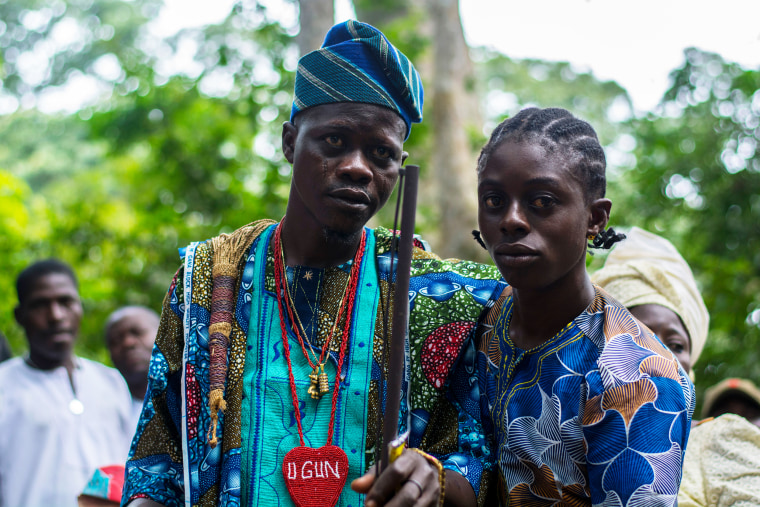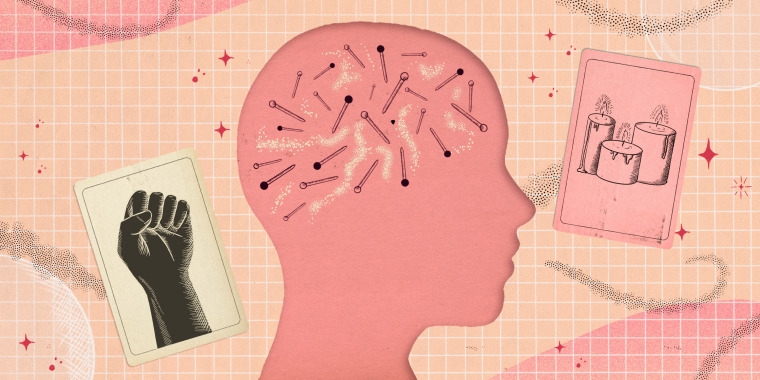I first heard about Vodou when I was around 7 years old. My mother was sending me to a friend’s house for a playdate, which sparked a few memories of her own playdates past. “I’d look for a broom behind the door or a table with candles,” she recounted as she helped me into my coat. “That’s how I would know I was in a house of Vodou.” She was extremely proud of the way she had spotted the signs, even listing them off on her fingers. “Watch out for chicken feet, too. That’s a dead giveaway.”
After that, conversations about Vodou became more consistent in my house. Mom would regale my siblings and me with stories from her child, like how my grandfather lost his foot to obeah, which coming from her meant black magic but is mostly a practice of spiritual healing. She told me the story of a neighbor who would turn herself into a cat and swim around in the buckets they used to catch rain. There was another about a man found in pieces one morning. He had been turning himself into a fly at night and robbing his neighbors until someone pulled a cursed string across the lock of their front door. The neighbors found him a few days later in bed, cut clean in half. I thought the stories were fascinating and begged her for more, but my mother would constantly remind me of how powerfully evil Vodou was, and would warn me to stay away from it.

“Thou shalt not Vodou” wasn’t the only rule I had to follow growing up. I grew up in a strict, Seventh-day Adventist household. If that sounds familiar, it might be because it’s the same religion as Ben Carson, one of the few Black members of the Trump administration and former GOP presidential hopeful. His book "Gifted Hands" chronicles his tumultuous childhood and credits his success as a surgeon to the meticulous way his mother raised him. My mother modeled the way she raised my siblings and me after Sonya Carson’s formula. Book reports once a week, practicing times tables on repeat, limited TV hours ... you know, regular parent stuff. But I was also expected to think only holy thoughts from sundown Friday to sundown Saturday. I was expected to "move in modesty," which I learned was obvious to everyone but me. I was expected to fall in love with the Bible, memorize the verses and read it every day. It was a binding, narrow existence that I found completely suffocating.
I attended Seventh-day Adventist schools throughout undergrad. Restriction, I learned from my peers, was the only path to heaven and happiness. Much of my young social life felt like a competition of who could perform the most penance and who could be the most chaste and pure. The pressure was intense.
As I got older, I became more curious about the part of my inner world that had been deigned “evil.” The more insistent my curiosity, the harder I whipped myself for thinking it. “The discomfort is necessary,” I would think as I denied myself pleasure after pleasure, not realizing that I was essentially waiting to die and go to heaven before I could experience bliss or fullness.

Little things started happening. Little silly things. I’d miss church for a week, then two. I’d forget to do my daily devotion for a month, do secular things on the Sabbath or wear noticeable makeup. Then I started breaking other rules, like having the occasional drink with friends, hanging out on Friday nights or challenging my pastor. Each time I participated in something supposedly illicit, I’d feel like mud afterward, like a sinner. I didn’t know who I was without my rules or outside of that small box. By my mid-twenties, I was deeply unhappy and moved to Chicago, where I didn’t know a soul, on a whim. I sat in my illegal, windowless apartment and wondered why the heck I’d made such a decision. I was scared. My fear kept me frozen until April 23, 2016, where alone in that dark apartment, Vodou found me.
You can stop Googling the date because YES, that was the day Beyonce’s project "Lemonade" debuted on HBO. I wasn’t even going to watch it had it not been for my sister's insistence, who threatened to disown me if I missed the visual album. So I watched it. I turned it on and expected to be blown away by the artistry and precision that's become signature to Beyonce's brand. What I didn't expect was an awakening.
I did not expect to become inspired to research, rewatch and research again. That was the day I learned about orishas and ori, and that Black people not only existed in mythology but had mythology all our own. I shed a few tears when I searched the terms Oshun and Oya and pictures of gorgeous, ebony-skinned Black women dressed in riches filled my screen. I had seen pictures of Hera and Aphrodite portrayed as powerful, pampered and worshipped. Never, NEVER had I imagined that someone who looked like me could be adored somewhere in the same way. I was officially shaken. The rush of confidence would have knocked me off my feet if I weren’t already nailed to the couch.
My research contradicted many of the stories of vengeance and evil that I’d grown up hearing. Although I was a somewhat rebellious child, I never challenged my mom on turning me away from Vodou. Any representation of Vodou I saw in popular culture was overwhelmingly negative. Vodou was not only associated with horror, it was the horror. The very mention of it conjured images of Voodoo dolls, odd poisonous mixtures and even human sacrifice. My mother and the culture around me taught Vodou as the opposite of Christianity. I was a Christian. I was raised in the light. To stay in the light meant staying far away from the dark.
But in my research, I learned that Vodou was born in West Africa and has been practiced for centuries. I learned about slave revolts led by Vodun practitioners and how slave-owning countries initiated a concerted effort to paint the religion as demonic and silly. I learned that Vodou was neither good nor bad, but vast. Up until then, I had thought of Vodou as witchcraft, but I was learning that it was so much bigger. It was the first religion I'd ever encountered that forced me to recognize my power to perpetuate good or evil in the world. I learned that there was no devil that I could blame misdeeds on. Vodou handed that agency back to me and with it, the responsibility of my actions.

My practice was very simple. I would light a candle and talk to my ancestors. I’d talk to my mother and grandmother about whatever I wanted to. Sometimes, I would light the candle just to feel a calming presence in the room while I wrote or meditated. Every once in a while, I’d leave my ancestors an offering: a bit of dinner that I made using a recipe that was passed down to me, or a piece of candy since my sweet tooth is hereditary. I began meeting with a group of practitioners that would talk about their experiences with Vodou divinity and, when I worked up enough courage, I asked my ancestors to guide me to deity who could provide me what I needed for the situation I was facing. Oya for change. Oshun for love. Ogun for conflicts. These requests prodded me to be specific about what I wanted and what I believed I needed to get there. Working with orishas and ancestors required strategy, a contrast to the rote obedience I was raised in. It was with that self-assurance that I was able to shed the last bit of shame that had hung over me most of my life, and was finally able to really live.
I had done it. I had stepped out of my Christian cave into the great beyond and, when my eyes adjusted, I could finally relax. The yearning that I felt for so many years to explore had been natural. Vodou was here to provide me with spiritual tools to guide me, not to rule me. The very essence of Vodou is that it encompasses everything, and therefore cannot be completely understood at any given time. To practice Vodou is to relinquish control and embrace your power, which is the only way I'm getting through the election, COVID-19 and the last four years of this administration. I had to quit trying to control what made me powerful and allow my talents to guide me. It was in this power that I found an invaluable calm.
It takes courage and faith to find that inner strength, but there is also an incredible peace in understanding your greatness. I found my power when I discovered Vodou and its mythology. That’s not everyone’s path, but anyone can learn to accept their own greatness. When you finally understand that you have little control over where your true potential can take you, but are willing trust in it anyway, you have no choice but to relax and enjoy the ride.


